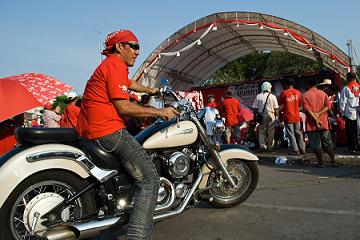Author’s Note
The “red shirts” are committed to non-violence, but somebody has been setting off bombs and taking potshots at government buildings anyway. Several soldiers in Bangkok have been wounded by grenade attacks in recent weeks and a few have even gone off in the northern capital of Chiang Mai.
The protesters have also employed some fairly disturbing tactics; two weeks ago, red shirt supporters donated dozens of liters of blood before throwing it on the government house and the prime minister’s residence.
Grenades, protests, and blood – how will it all affect tourism? The number of foreign visitors in 2010 is estimated to be down 30% compared to last year, and at nearly 7% of its GDP, tourists are one asset Thailand can’t afford to lose.
The dip in revenues is so severe that workers in the tourist industry have actually planned a protest against all the protesting. At least 30 embassies around the world have told their citizens to exercise “extreme caution” when visiting Bangkok, even going so far as to warn against visiting major tourist sites.
Despite what the television, US State Department, and even Thai people will tell you, Bangkok and the rest of the country aren’t any more dangerous than they were ten years ago (with the notable exception of the extreme south). The scattered accounts of violence, none of which have been targeted at or anywhere near foreigners, have predictably been overplayed by an action-hungry media.
Most of Thailand remains safer than any major American city.
Still, the protests are a sensitive issue.There’s no reason to cancel your trip to Thailand yet, but the situation is worth watching. Even if the red shirts get what they want, the King’s ailing health points towards another political crisis in the coming years.
Increasing violence in the far south shows no sign of abating, either. Thailand remains a fantastic destination worthy of a place on any traveler’s itinerary, but it will have to overcome a few challenges to maintain its reputation as the Land of Smiles.





